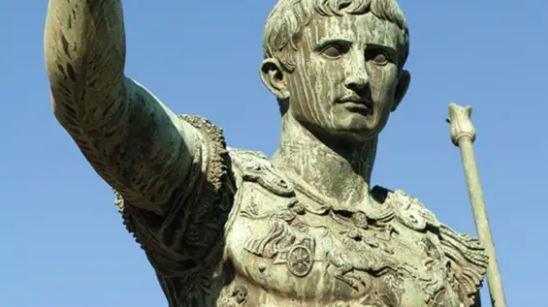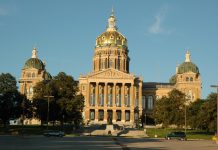This is Part Five of a Six-Part series titled “THE BIBLE, THE CONSTITUTION, AND THE JURISDICTIONAL SEPARATION OF CHURCH AND STATE.” If you would like a full illustrated transcript of this series, send an email to [email protected]
“Getting to Know Your Church-State Jurisdictions” is Part One in this series, “The Biblical Model of Church and State” is Part Two, Part Three is “Can Secularism Account for Morality in Government?, and Part Four is “Biblical Examples of Church and State Jurisdictional Separation.”
When Jesus was asked by the Pharisees who “plotted together how they might trap Him” if it was “permissible to pay a poll-tax to Caesar, or not,” Jesus answered, “pay to Caesar the things that are Caesar’s; and to God the things that are God’s” (Matt. 22:21). We don’t live under Caesar, and if we did, Caesar was bound to follow God’s limitations on his civil office because God’s image is stamped on him. We have specific constitutional freedoms in the same way that elected officeholders have constitutional limitations. Our rulers do not have a “divine right” to rule. They are “ministers of God” (Rom. 13:4) even if they do not recognize God’s sovereignty over them. In a sense, the Constitution is our “Caesar” (Matt. 22:21), but unlike Caesar, the Constitution binds and limits those who rule in terms of it. As citizens, we can replace our rulers. Civil authorities govern at our discretion but under the watchful eye of God.
Israel was under God’s direct judgment. They did not have any civic rights. Some Jews like Paul did have specific rights because they were Roman citizens (Acts 16:35–40; 22:22–29). Later, Paul appealed directly to Caesar (25:9–12).
We must understand something very thoroughly. If the state gives the rights, it can take them away — they’re not inalienable. If the states give the rights, they can change them and manipulate them. But this was not the view of the founding fathers of this country. They believed, although not all of them were individual Christians, that there was a Creator and that this Creator gave the inalienable rights — this upon which our country was founded and which has given us the freedoms which we still have — even the freedoms which are being used now to destroy the freedoms.[1]
“Bradley Johnson had banners hanging in his classroom at Westview High School in San Diego, Calif., for more than 17 years with phrases like ‘In God We Trust’ and ‘All Men Are Created Equal, They Are Endowed by Their Creator,’ only to have the principal order them torn down during the 2007 school year.” Another sign that had been hanging in his classroom for 25 years “contained the words ‘In God We Trust,’ ‘One Nation Under God,’ ‘God Bless America’ and ‘God Shed His Grace On Thee.’”[2]
Each of these postings is part of America’s religious history. “In God We Trust” is our nation’s official motto and appears prominently in the House of Representatives as well as our currency.
That Americans are “endowed by their Creator” is found in the Declaration of Independence. “One Nation under God” is from the Pledge of Allegiance. The phrase “under God” was added to the Pledge of Allegiance on June 14, 1954, by a joint resolution of Congress. “God Bless America” is a patriotic song originally written by Irving Berlin in 1918 and revised by him in 1938 because of the rise of Adolf Hitler. Here are the words from the stanza that include the words “God Bless America”:
God Bless America,
Land that I love.
Stand beside her, and guide her
Through the night with a light from above.
From the mountains, to the prairies,
To the oceans, white with foam
God bless America, My home sweet home.
“God Shed His Grace on Thee” is a line from the patriotic song “America the Beautiful.” In all these examples, America’s religious heritage is evident. The principal of Westview High School did not see it this way. He considered their posting in a government school to be a violation of the First Amendment’s Establishment Clause: “Congress shall make no law respecting an establishment of religion….” United States District Court Judge Roger T. Benitez objected with reasoned historical, legal, and logical arguments:
May a school district censor a high school teacher’s expression because it refers to Judeo-Christian views, while allowing other teachers to express views on a number of controversial subjects, including religion and anti-religion? On undisputed evidence, this court holds that it may not…. That God places prominently in our Nation’s history does not create an Establishment Clause violation requiring curettage and disinfectant for Johnson’s public high school classroom walls. It is a matter of historical fact that our institutions and government actors have in past and present times given place to a supreme God. “We are a religious people whose institutions presuppose a Supreme Being.”[3] As the Supreme Court has acknowledged, “[t]here is an unbroken history of official acknowledgment by all three branches of government of the role of religion in American life from at least 1789.”[4]
* * * * *
Fostering diversity, however, does not mean bleaching out historical religious expression or mainstream morality. By squelching only Johnson’s patriotic and religious classroom banners, while permitting other diverse religious and anti-religious classroom displays, the school district does a disservice to the students of Westview High School and the federal and state constitutions do not permit this one-sided censorship.[5]
When the Constitution was signed on September 17, 1787, it did not contain a Bill of Rights. This means there was no First Amendment. The Constitution as drafted was sent to the states for ratification. The Federalists supported it while the Anti-Federalists opposed it. The Anti-Federalists wanted a bill of rights. The Federalists argued that a bill of rights was unnecessary since the Constitution created a national government of enumerated powers. With this form of government, unless a power was spelled out in the document, it did not exist. Since the Constitution did not give the national government legislative power over religion, Federalists considered a bill of rights unnecessary and even dangerous. To mention a subject was thought to give the Federal government control over it. John Jay (1745–1829), one of the authors of the Federalist Papers and the first Chief Justice of the United States, stated it this way:
Silence and blank paper neither grant nor take away anything. Complaints are also made that the proposed Constitution is not accompanied by a bill of rights; and yet they who make the complaints know, and are content, that no bill of rights accompanied the constitution of this State [New York].[6]
Jay’s point was that since the Constitution did not mention religion—it was silent on the subject and made no written reference to it—therefore it did not have jurisdiction over it. There was some precedent on a list of rights in English and American history: George Mason’s Virginia Declaration of Rights (1776), the English Bill of Rights (1689), and earlier English political documents such as Magna Charta (1215).
The Anti-Federalists disagreed with the claim that silence made rights undeniable and jurisdictionally untouchable. Most of the founders had an innate and historical suspicion of centralized civil government. Without further restraints on basic individual rights, they feared that the Federal government could exercise powers not granted to it because they were not prohibited by the Constitution. Better safe than sorry the Anti-Federalists argued. They reasoned that a formal declaration of rights was essential to secure certain liberties. Virginia, New York, Rhode Island, and North Carolina requested amendments concerning freedom of religion, press, assembly, and speech. The Virginia Convention stated the following regarding religion in Article 16 of the Virginia Declaration of Rights:
That religion, or the duty which we owe to our Creator and the manner of discharging it, can be directed by reason and conviction, not by force or violence; and therefore, all men are equally entitled to the free exercise of religion, according to the dictates of conscience; and that it is the mutual duty of all to practice Christian forbearance, love, and charity towards each other.[7]
Borrowing language from the Declaration of Independence, the Federalists made it clear that rights are not granted by civil governments but are “natural and unalienable.” Notice that the foundation for such personal and civil admonition is based on Christian principles. God is the ultimate source of rights.
The Anti-Federalists won the argument. Their mistrust of government was broad enough that the states insisted on adding amendments over the objections of the Federalists. Twelve amendments were put forth, but only ten were adopted and voted on.
















